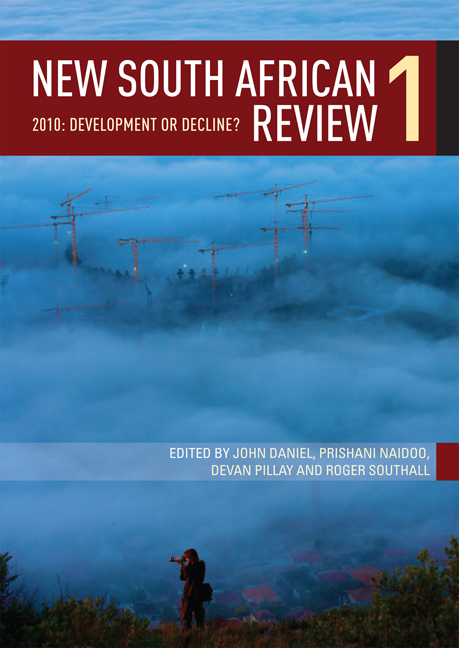Preface
Published online by Cambridge University Press: 21 April 2018
Summary
In producing this, the first edition of the New South African Review, its editors seek to follow that tradition of critical scholarship established so firmly by the seven volumes of the South African Review which appeared in the 1980s and 1990s. They provided invaluable insights into the apartheid state's strategies and the popular responses and struggles of those troubled and difficult years. Now, fifteen years into the making of South Africa's democracy, the issues which face our society are very different, albeit bearing the heavy imprint of the country's divided and unequal past. Since 1994, the successive governments headed by ANC presidents Mandela, Mbeki, Motlanthe and Zuma have not only had to assume the normal burdens of state but also to confront massive challenges of transformation across the political, economic, social and international spheres.
In retrospect, there have been considerable achievements. Yet, again, there have been many wrong moves, many downright failures and many disappointments, even though we should, perhaps, be humble enough to recognise that, with its particular legacies, South Africa is not an easy country to govern. Thus it is that the objective of the New South African Review is to provide a forum for reflection upon achievements, problems and challenges, and to stimulate debate between divergent positions held upon a wide range of issues. It is intended to be accessible to a wide range of readership, and to draw upon authors from well beyond academia. Its objective is to be informative, discursive and, at times, to be downright provocative. It is not intended to be an annual review of events, although it will seek to provide contemporary comment, and it will engage with (indeed, seek out) current controversies.
The New South African Review is housed in the Department of Sociology at the University of the Witwatersrand. We should like to acknowledge, with thanks, financial support from the Konrad Adenauer Foundation and from the Faculty Research Committee of the Faculty of Humanities at Wits. Neither of those bodies is responsible for any of the views expressed in any chapters of this volume, but both have kindly provided the material means whereby workshops and editorial meetings have been held, and peer review of all chapters conducted. Without their encouragement and backing this project would never have got going.
- Type
- Chapter
- Information
- New South African Review2010: Development or Decline?, pp. ix - xPublisher: Wits University PressPrint publication year: 2010



